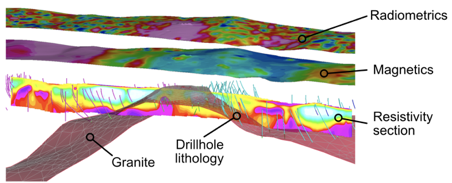INFACT is going to be presented at the Canadian Exploration Geophysical Society (KEGS) Symposium 2020 “Success from Innovation”
The Canadian Exploration Geophysical Society (KEGS) is organising a Symposium 2020 “Success from Innovation” in Toronto, Canada, February 29th, 2020. As exploration moves increasingly deeper or under cover, our methods and technologies must adapt to solve these new challenges. At the same time, there is an ever-increasing responsibility for safety and environmental protection. The 2020 KEGS Symposium will include talks that illustrate the value of innovation leading to exploration success, as well as the application of geophysics to solve environmental and geotechnical problems. The categories that will be covered include are 1) Exploration Success Stories; 2) New Applications and Stories; 3) Environmental and Geotechnical Geophysics.

INFACT project is going to be presented by Sandra Lorenz from HZDR (Researcher at Helmholtz-Institute Freiberg for Resource Technology). She will present INFACT’s approach on exploration technology performance criteria on Saturday (29/02) at 09:10: Beyond seeing the target: taking into account new parameters to measure the efficiency of exploration technologies.
Read the abstract of the INFACT presentation below.
Beyond seeing the target: taking into account new parameters to measure the efficiency of exploration technologies
Authors: Leila Ajjabou, Moritz Kirsch, Richard Gloaguen, Sandra Lorenz, Helmholtz Institute Freiberg for Resource Technology (HIF-HZDR)
There is a growing demand for mineral resources worldwide, and yet industry is facing increasing obstacles in obtaining public acceptance for new exploration and mining activities. Numerous recent citizen protests highlight the negative public perception of mining projects starting from its earliest phase: exploration. This phenomena increases the reluctance of investors to finance exploration in a context of tense relationships with communities.
 We argue that technological innovation in the minerals industry driven by the need to improve performance according to social, as well as environmental, safety and efficiency criteria could be an answer to a thriving exploration sector. Non-invasive exploration techniques can be defined as energy efficient, low-impact technologies. They assist in the detection and mapping of mineral deposits and improve exploration targeting with minimal environmental impact, while demonstrating that industry cares about reducing disturbance to the communities and environment in which they operate.
We argue that technological innovation in the minerals industry driven by the need to improve performance according to social, as well as environmental, safety and efficiency criteria could be an answer to a thriving exploration sector. Non-invasive exploration techniques can be defined as energy efficient, low-impact technologies. They assist in the detection and mapping of mineral deposits and improve exploration targeting with minimal environmental impact, while demonstrating that industry cares about reducing disturbance to the communities and environment in which they operate.
To demonstrate this premise, we established an EU-funded research project called INFACT (Innovative, Non-Invasive and Fully Acceptable Exploration Technologies), which supports the development of innovative exploration and stakeholder engagement approaches. Our project is establishing a set of permanent test sites that are unique in providingan assessment of technical, social, and environmental performance of exploration technologies on well-constrained geology and mineralisation. The INFACT European Reference Sites, located in Spain (Rio-Tinto and Cobre Las Cruces), Germany (Ore Moutains) and Finland (Sakatti), feature a rich and diverse exploration portfolio including extensive drillhole and geophysical databases and cover a broad range of geological, social and climatic conditions to cater for a wide variety of exploration challenges. The sites are open for use by technology developers and exploration service companies and will allow an assessment of innovative exploration techniques like airborne SQUID magnetics, broadband and radio magnetotellurics, passive seismic, airborne long-wave hyperspectral imaging, UAV magnetics and radiometrics and low-frequency Airborne-EM – both in terms of technical ability to map go deeper or under-cover and identify mineraldeposits and in terms of environmental impact and monitoring, and perception of local stakeholders in the diverse contexts of exploration.

Ultimately, INFACT will result in a label for best practice mineral exploration which will provide comfort and confidence to exploration decision makers, investors and civil society.

![]()



 We argue that technological innovation in the minerals industry driven by the need to improve performance according to social, as well as environmental, safety and efficiency criteria could be an answer to a thriving exploration sector.
We argue that technological innovation in the minerals industry driven by the need to improve performance according to social, as well as environmental, safety and efficiency criteria could be an answer to a thriving exploration sector.